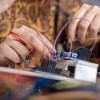Studying in public spaces: Should you give it a go?

Before I started university a few months ago, I had almost always studied in my room, in noiseless seclusion. However, that changed when I had to catch up on studies between university classes, and I had to sit down in my university's bustling study hall to study. I was unsure whether I could focus and be productive in a place with so many people. To my pleasant surprise, not only could I focus, but I also found myself to be even more productive than I usually was in my room.
Sociologist Ray Oldenburg introduced the concept of "third places" in his book The Great Good Place. According to Oldenburg, third places are the informal public spaces that are neither home (first place) nor work (second place). These places, which include cafes, parks, and libraries, provide a neutral ground for people to gather, socialise, and engage in community life.
For students, these third places can become crucial study environments that break the monotony of studying at home or in a dorm room. If you find it difficult to focus in a quiet environment, wish to experiment with your study methods, or are curious about whether you could focus better in a different setting, you might consider studying in a public place.
The primary reason studying in public spaces can be a good idea is the boost in concentration and productivity these environments can offer. This boost is mainly due to moderate levels of ambient noise, subtle social pressure, and reduced feelings of isolation.
A study published in the Journal of Consumer Research found that moderate levels of ambient noise can enhance creative thinking and problem-solving skills. The ambient buzz of a cafe, for instance, provides a level of stimulation that is just right to keep the brain engaged without becoming overwhelmed, helping to maintain focus on the task at hand.
The variety of environments in public spaces can stimulate the brain in different ways. Changing study locations within a public space, such as moving from a quiet corner to a more bustling area, can refresh the mind and prevent study fatigue. This variation can keep the brain engaged and make long study sessions more manageable.
Interestingly, the presence of other people who are also working or studying can have a motivational effect. This phenomenon, often referred to as the "co-action effect," suggests that being around others who are engaged in similar tasks can enhance one's own performance. Seeing others focused and working hard can create a subtle form of social pressure and inspiration, encouraging students to stay focused and productive. Robiah Arefin, a recent A level graduate, talks about his experience, "I feel productive when I am in a place where others are also working. Having other people around me doing their own things also gets me in the mindset to work, and keeps me subconsciously accountable."
Similarly, studying in public spaces can alleviate the feelings of isolation that often accompany solitary study sessions. The presence of others, even strangers, can provide a sense of community and belonging. This phenomenon is supported by the "social facilitation" theory, which posits that the mere presence of others can enhance an individual's productivity. For students who feel lonely or disconnected, studying in a lively, populated space can offer a reassuring sense of human connection. Farhan Khan*, a student of North South University, tells us how he often gets through his study sessions more easily when there are other people around him. "I live alone, and it gets pretty lonely when I study by myself at home, however, when I study at university or a nearby cafe, I feel more at ease, and less lonely, and I find that I can study much better that way."
However, it is important to note that studying in a public place may not work for everyone. Aricia Chakma, who studies Environmental Science at North South University, tells us how studying in a public place doesn't work for her. "I find it very hard to focus in an environment where there is a lot of noise or activity. As someone diagnosed with ADHD, the constant distractions make it nearly impossible for me to concentrate on my studies. My mind is always a chaos itself, so the outside noise only adds to the difficulty. I need a quiet and controlled environment to be productive. However, the presence of one or two close friends while I study helps me stay on track, and keeps me accountable."
For people who can study better in a public place, choosing the right space is crucial. Not all public spaces are created equal, and finding the right environment for studying is important. Factors to consider include noise levels, availability of seating, access to power outlets, and Wi-Fi connectivity.
Libraries offer a quieter atmosphere conducive to deep focus, while coffee shops provide a more dynamic and stimulating environment. Parks and outdoor spaces can be ideal for reading and brainstorming sessions, especially during pleasant weather. In addition, studying in public spaces can potentially lead one to be distracted, However, this can be managed with a few strategies. Using noise-cancelling headphones or listening to instrumental music can help filter out unwanted noise. Setting clear goals and time limits for study sessions can also improve focus and productivity.
In an increasingly digital and remote world, reclaiming public spaces for study can provide a refreshing and productive change of pace. Whether it's the quiet hum of a library, the vibrant atmosphere of a coffee shop, or the serene beauty of a park, public spaces offer diverse and enriching environments that can support academic success and personal growth. So, the next time you find yourself struggling to focus at home, you may consider packing your books and heading to a public space.
References
Journal of Consumer Research. (2012). Is noise always bad? Exploring the effects of ambient noise on creative cognition.
Da Capo Press. (1999). The Great Good Place: Cafes, Coffee Shops, Bookstores, Bars, Hair Salons, and Other Hangouts at the Heart of a Community.
Psychological Bulletin. (1983). Social facilitation: A meta-analysis of 241 studies.
Bipra Prasun Das is an undergraduate student at North South University

 For all latest news, follow The Daily Star's Google News channel.
For all latest news, follow The Daily Star's Google News channel. 








Comments